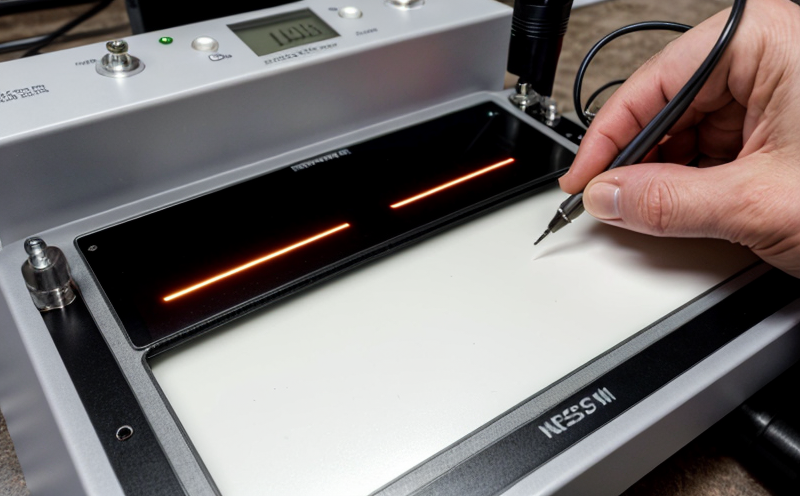Capacitive testing for layer thickness measurement
Accurate Layer Thickness Measurement The Power of Capacitive Testing
In todays fast-paced and highly competitive industrial landscape, ensuring the quality and integrity of materials is crucial for businesses across various sectors. One critical aspect of material evaluation is layer thickness measurement, which plays a vital role in determining the overall performance and durability of products. Among the numerous testing methods available, capacitive testing stands out as a reliable and efficient solution for measuring layer thickness.
At Eurolab, our team of expert technicians and scientists have extensive experience in providing laboratory services that cater to the diverse needs of industries worldwide. Capacitive testing is one of our specialized services, which we offer to help businesses like yours obtain accurate and precise measurements of layer thickness. In this article, we will delve into the world of capacitive testing, exploring its advantages, key benefits, and frequently asked questions.
What is Capacitive Testing for Layer Thickness Measurement?
Capacitive testing is a non-destructive evaluation (NDE) technique used to measure the thickness of various layers on materials. It works by detecting changes in capacitance, which occurs when an electric field interacts with the materials surface. This method is particularly effective in determining the thickness of thin films, coatings, and other layered structures.
The Advantages of Capacitive Testing
Capacitive testing offers numerous benefits over traditional measurement methods. Here are some of the key advantages
High Accuracy Capacitive testing provides precise measurements with high accuracy, ensuring that you obtain reliable data for your products.
Non-Destructive Evaluation This method is non-invasive and does not damage the sample, making it ideal for measuring layer thickness without affecting its integrity.
Fast Measurement Times Capacitive testing is a quick process, allowing you to obtain results in a matter of minutes rather than hours or even days.
Multi-Layer Measurement This technique can measure multiple layers simultaneously, providing a comprehensive understanding of the materials structure.
Low Cost Compared to other NDE methods, capacitive testing is cost-effective and provides excellent value for money.
Key Benefits of Capacitive Testing
Here are some key benefits of using capacitive testing for layer thickness measurement
Improved Product Quality Accurate measurements enable you to optimize your production processes, resulting in higher-quality products that meet customer expectations.
Reduced Waste By detecting potential defects early on, you can minimize waste and reduce the risk of costly rework or recalls.
Increased Efficiency Capacitive testing streamlines your quality control process, saving time and resources while enhancing productivity.
Enhanced Customer Satisfaction With precise measurements, you can provide customers with accurate information about their products, fostering trust and loyalty.
Frequently Asked Questions
Weve compiled a list of frequently asked questions to help you better understand capacitive testing for layer thickness measurement
Q What types of materials can be measured using capacitive testing?
A Capacitive testing is suitable for various materials, including metals, polymers, ceramics, and composites.
Q How accurate are the measurements obtained through capacitive testing?
A Our team at Eurolab uses state-of-the-art equipment to ensure high accuracy in our measurements. Typical measurement uncertainties range from 5 to
Q Can capacitive testing be used for multi-layer materials?
A Yes, capacitive testing can measure multiple layers simultaneously, providing a comprehensive understanding of the materials structure.
Q Is capacitive testing a destructive or non-destructive evaluation method?
A Capacitive testing is a non-destructive evaluation (NDE) method, which means it does not damage the sample.
Q How long does capacitive testing typically take?
A Measurement times vary depending on the complexity of the sample and the number of layers being measured. However, typical measurement times range from a few minutes to several hours.
Conclusion
In conclusion, capacitive testing for layer thickness measurement is an essential service provided by Eurolab that offers numerous benefits for businesses across various sectors. With its high accuracy, non-destructive evaluation capabilities, fast measurement times, and multi-layer measurement capacity, this method has revolutionized the way industries evaluate materials.
At Eurolab, our team of experts is committed to providing top-notch laboratory services that cater to your unique needs. By choosing capacitive testing for layer thickness measurement, you can ensure accurate results, improve product quality, reduce waste, increase efficiency, and enhance customer satisfaction.
Contact us today to learn more about how capacitive testing can benefit your business.




